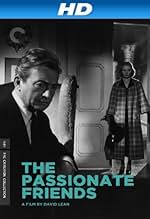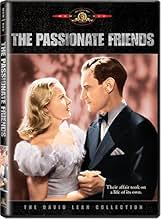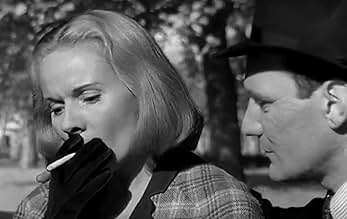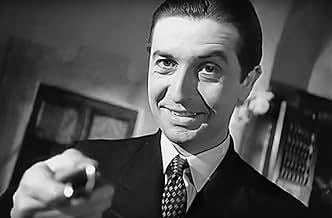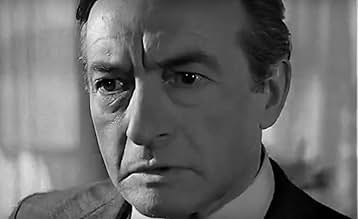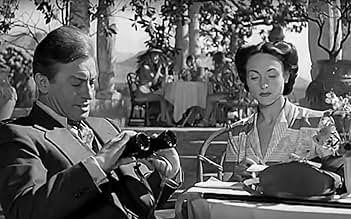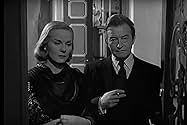IMDb-BEWERTUNG
7,2/10
3371
IHRE BEWERTUNG
Eine Frau trifft einen Mann, dessen Liebe sie vor Jahren abgelehnt hat.Eine Frau trifft einen Mann, dessen Liebe sie vor Jahren abgelehnt hat.Eine Frau trifft einen Mann, dessen Liebe sie vor Jahren abgelehnt hat.
- Auszeichnungen
- 2 Gewinne & 1 Nominierung insgesamt
Hélène Burls
- Flowerwoman
- (Nicht genannt)
Amy Dalby
- Lady on Underground
- (Nicht genannt)
Lisa Daniely
- Cinema Usherette
- (Nicht genannt)
Max Earle
- Third Man - Albert Hall
- (Nicht genannt)
Edward Evans
- Underground Ticket Officer
- (Nicht genannt)
Arthur Howard
- Smith - Butler
- (Nicht genannt)
John Huson
- First Man - Albert Hall
- (Nicht genannt)
Wilfrid Hyde-White
- Lawyer
- (Nicht genannt)
Charles Lloyd Pack
- Man Drinking with Stratton
- (Nicht genannt)
Guido Lorraine
- Hotel Manager
- (Nicht genannt)
Ina Pelly
- Second Woman - Albert Hall
- (Nicht genannt)
Helen Piers
- First Woman - Albert Hall
- (Nicht genannt)
Marcel Poncin
- Hall Porter
- (Nicht genannt)
Empfohlene Bewertungen
This David Lean romance seems to have been swept under the carpet and yet it may be his most underrated masterpiece, (it's infinitely preferable to such elephantine fare as "Ryan's Daughter" and "Doctor Zhivago"). It marked the first time Lean would abandon the studio for more exotic locations, (in this case, the Swiss Alps), and seems designed as a vehicle for his wife, Ann Todd, who is outstanding as the respectable English wife who dallies with an old flame who happens to check into the room next door at the hotel she's staying in while on holiday. He's Trevor Howard and it's as if this is what might have happened in "Brief Encounter" had the lovers a bit more chutzpah.
Howard, too, is superb, (he always was; he remains one of the most underrated of all the great actors), and Todd's husband is the consistently excellent Claude Rains at his very best. As a tale of a genteel marriage threatened by genteel adultery it's beautifully done and why it isn't more highly appreciated is something of a mystery. If, like me, you believe Lean to be one of the great directors then this is essential viewing.
Howard, too, is superb, (he always was; he remains one of the most underrated of all the great actors), and Todd's husband is the consistently excellent Claude Rains at his very best. As a tale of a genteel marriage threatened by genteel adultery it's beautifully done and why it isn't more highly appreciated is something of a mystery. If, like me, you believe Lean to be one of the great directors then this is essential viewing.
H. G. Wells wrote his novel in 1913 and it was first filmed by Maurice Elvey in 1922. By all accounts David Lean was reluctant to take it on and did so only as a favour to Ronald Neame. Once he agreed to do it however nothing less that the very best would do. Although Eric Ambler is credited with the screenplay, he was aided considerably by Lean and Stanley Haynes. Ann Todd with whom Lean had initial 'temperament' problems and Trevor Howard are both superb as the lovers. Howard replaced Marius Goring who would not have suited. Lean had a habit in his films of sometimes making an actor in the cast feel 'left out'. In this case the victim was Howard. The film actually belongs to Claude Rains for whom Lean had the deepest admiration. His portrayal of the betrayed husband is consummate and a masterclass in great film acting. Lean's own verdict on the film? 'Very nearly very good but a little cold'. I feel he was being unduly harsh on himself as anyone who is left unmoved by the final scene has a heart of stone. The film was criticised at the time for its extensive use of flashbacks. Ones heart goes out to those poor souls in the audience who get so easily confused! Lean's mastery of the visual, his 'cutter's' instinct and the excellent performances make this an absorbing and immensely satisfying film.
I was surprised to learn that the original story for The Passionate Friends was written by H.G. Wells. Someone nowadays we identify with the science fiction genre. Certainly it seems to be what has survived best in English literature.
The original story was written in 1913 so some considerable updating was done to make it 1949 contemporary. Lovers Ann Todd and Trevor Howard had an affair back in the day which was ended when Todd's husband Claude Rains found out.
Eleven years go by and Todd and Howard meet at a mountain ski resort in Switzerland. Howard's now married and moved on, but they spend an innocent afternoon reminiscing. Rains catches them and misinterprets with near tragic results.
Ann Todd may be one of the most beautiful women ever to grace the silver screen. She's probably best known in America for being Gregory Peck's loyal wife in The Paradine Case. No wonder Rains is so jealous.
Trevor Howard is essentially doing the same part for David Lean that first got him stardom in Brief Encounter. In fact the story could almost be what happens to the protagonists in Brief Encounter if they met up again in the future. Claude Rains is always right on the money with his portrayals. There's a lot of what John Barrymore did in Maytime in what Rains does here.
If it were done here in the USA, this would have been labeled a woman's picture. It is in fact a nicely done romantic story.
The original story was written in 1913 so some considerable updating was done to make it 1949 contemporary. Lovers Ann Todd and Trevor Howard had an affair back in the day which was ended when Todd's husband Claude Rains found out.
Eleven years go by and Todd and Howard meet at a mountain ski resort in Switzerland. Howard's now married and moved on, but they spend an innocent afternoon reminiscing. Rains catches them and misinterprets with near tragic results.
Ann Todd may be one of the most beautiful women ever to grace the silver screen. She's probably best known in America for being Gregory Peck's loyal wife in The Paradine Case. No wonder Rains is so jealous.
Trevor Howard is essentially doing the same part for David Lean that first got him stardom in Brief Encounter. In fact the story could almost be what happens to the protagonists in Brief Encounter if they met up again in the future. Claude Rains is always right on the money with his portrayals. There's a lot of what John Barrymore did in Maytime in what Rains does here.
If it were done here in the USA, this would have been labeled a woman's picture. It is in fact a nicely done romantic story.
Invariably this film is bound to be compared to "Brief Encounter" and I guess that's to be expected given they were both directed by David Lean, starred Trevor Howard and featured adultery. Frankly I think any comparison to be unfair because that's where their similarities end. I've seen both and I favor "Passionate Friends". I should add that Ann Todd is not one of my favorite performers. Her demeanor can be expressionless and somewhat off putting. But here she truly shines. In Lean's extensive close ups she reveals inner feelings without uttering a word. And her smiles are explosively radiant. She utterly owns this part. The male parts are equally excellent. All the performances wrap the viewer with their passion and involve him in the characters' fates. This is not light viewing. It's an emotional roller coaster and as the climactic finale unfolded I found myself talking to the screen trying to influence the outcome. Without a doubt this is a story by adults, for adults. Highly recommended.
This Rank/Cineguild production directed by David Lean is based on a novel by H G Wells, here adapted by Lean and Stanley Haynes, though with a screenplay credited to Eric Ambler. Although the plot is about a triangle, Lean's focus is on Ann Todd as the woman between two men, her husband and the man who was her first love but whom she refused to marry. Her situation is presented in an exchange between the man, Trevor Howard and Todd - "If two people really love each other they want to be together. They want to belong to each other", Todd - "I want to belong to myself", "Then your life will be a failure". However in the tradition of upper class Brits, Todd's life of failure means a marriage to a successful banker, Claude Rains. The narrative has an unusual triple flashback structure, which is perhaps why it needed three writers, with the present being narrated by Todd with the prospect of a divorce, and flashbacks to the vacation in Switzerland where the instigating incident occurs, Todd's memory/flashback of 9 years earlier re-meeting Howard, and small memories of their first romance. The initial meeting is tainted by lines like Todd's "Why can't we be in love without the clutching and gripping", though later Todd admits to "not being a very good person". Howard's character has his ambiguities too, being a university biology lecturer who knowingly has an affair with a married woman. The infidelity gets a funny spin by Rains' business with Germany and Italy pre-WW2, and Rains saying he has "a taste for intrigue", though the film being made post-WW2 allows him to speak of the "Teutonic hysteria" of the Germans. In spite of some of Lean's technical touches, the thing that de-passionates the situation is Todd, in her first film for her then husband. Whilst at times she resembles Garbo, the rather butch Todd lacks the divine one's expressiveness, with Lean reduced to filming her running from Howard in slow motion to give her some lyricism. All three of the leads are oddly lit indelicately, perhaps to suggest that all this passage of time has aged them, but this with Todd, adds to the destruction of romantic intent. Lean provides a vocal montage of telephone conversations, cuts from a kiss to a bunch of flowers, doors slamming to a typewriter slide of the divorce document, gives Rains a cuckold paranoid montage, and has a "Keep Smiling" poster featured in the background of the climactic scene in the train underground, though the idea of Todd not buying a ticket before she enters rather pre-empts things. Rains has the audience empathy, even if the odd way he stand in a ¾ pose when he confronts someone seems silly. He is the more emotional of the three, but because of the British standards of polite behaviour, his yells are either heard off-camera or with his back to us. The best scene reads as Hitchcock-influenced with Rains dictating to his secretary and Lean continually cutting to a pair of tickets to a play Todd and Howard go to see. The title First Love gets a comic payoff when we hear it is a musical with a fatuous title song.
Wusstest du schon
- WissenswertesThis movie is based on the 1913 novel "The Passionate Friends" by H. G. Wells, who also wrote "The Invisible Man", which was made into a 1933 hit movie starring Claude Rains, one of the stars in this movie.
- PatzerWhen Steven barges into Howard's office, he is shown starting to close the door, followed by the sound of a door closing. However, in the subsequent shot, the door is open again.
- Zitate
Mary Justin: I'm not a very good person, Steven. I wanted your love - and I wanted Howard's affection and the security he could give me.
Professor Steven Stratton: I can give you security too, and more than affection.
Mary Justin: You don't really know me at all. My love isn't worth very much.
- VerbindungenFeatured in Discovering Film: Claude Rains (2015)
Top-Auswahl
Melde dich zum Bewerten an und greife auf die Watchlist für personalisierte Empfehlungen zu.
- How long is The Passionate Friends?Powered by Alexa
Details
- Erscheinungsdatum
- Herkunftsland
- Sprachen
- Auch bekannt als
- Apasionada
- Drehorte
- Le Brévent, Chamonix, Haute-Savoie, Frankreich(cable car outing at Brévent in front of Pic du Midi)
- Produktionsfirmen
- Weitere beteiligte Unternehmen bei IMDbPro anzeigen
Box Office
- Weltweiter Bruttoertrag
- 40.335 $
- Laufzeit
- 1 Std. 35 Min.(95 min)
- Farbe
- Seitenverhältnis
- 1.37 : 1
Zu dieser Seite beitragen
Bearbeitung vorschlagen oder fehlenden Inhalt hinzufügen


